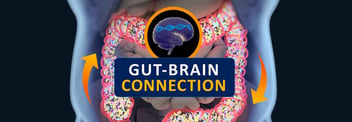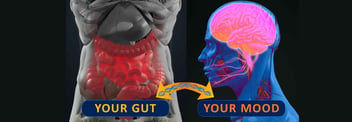Can the Microbiome Cause ADHD?
- Home
- Blog

The microbiome is the next frontier of mental health treatment. Studies have demonstrated the connection between the microbiome, the brain, and ADHD. Harnessing the power of that connection may change the future of ADHD treatment. In this blog, you will learn:
- The connection between ADHD and the microbiome
- The interaction between the microbiome and the brain may cause ADHD
- The future of ADHD treatment
What is ADHD, and how is the microbiome involved?
ADHD effects approximately 6% of US children, making it one of the most prevalent neurodevelopmental and neurobehavioral disorders. Despite its frequency, we know strikingly little about its underlying causes. ADHD is commonly characterized by hyperactivity and impulsivity, inattentiveness, or a combination of all three—however, like autism, this is a heterogeneous disease that can look very different from patient to patient. That said, there are a few hallmarks of ADHD displayed by a large swath of patients with this disorder—and several can be directly tied back to the microbiome.
Patients with ADHD frequently display increased incidence of gastrointestinal issues and regularly suffer with immune dysregulation, low-grade inflammation, and a leaky gut. These are all warning signs that the microbiome is sending bad signals to the brain. Let’s review what we know about GI issues and their connection to mental health:
- First, we know our microbiomes and brains are intricately interconnected through the “Gut Brain Axis”, and that our gut bugs can “speak” directly to our nervous system and other bodily systems via the passage of various metabolites, hormones, and other “messenger” compounds from our intestinal tract into our bloodstream.
- Second, we know that the messages sent from a dysregulated microbiome—a “leaky gut”, that is—are different than the messages sent from a healthy microbiome.
- And third, we know that the toxins and bad gut bugs found in a gut in dysbiosis can lead to inflammation and trigger an autoimmune response that has further impact on our mental health.
The consequences of a dysregulated gut, of course, are the most obvious ways the microbiome may be implicated in ADHD. But gut bugs are also increasingly implicated in another significant hallmark of the disorder—like the game of Mouse Trap, they may begin a chain reaction that leads directly to another hallmark trait of ADHD: a dysfunction of the brain’s reward pathway.
The microbiome, ADHD, and the brain
Patients suffering from ADHD demonstrate dysfunction in their brain’s reward pathway. This pathway plays a critical role in “reinforcement, motivation, and learning how to associate various stimuli with reward”—and to function properly, it relies almost entirely on our body’s supply of dopamine. Here’s how it works: when we engage in activities that are beneficial to our survival—like drinking, eating, and reproduction—dopamine is released. As we’ve discussed before on this blog, dopamine is a “feel good” or “pleasure” chemical. It makes us feel joyful and euphoric, and in terms of our reward pathway, feeling good after we partake in an activity leads to a desire to partake in it again and again.
Now, here’s where things get interesting. The dopamine release that keeps our reward system pathway regulated is just the end of a long chain reaction of circumstances—and that chain reaction begins in the microbiome. Researchers studying the microbiome have found that patients with ADHD display elevated levels of Bifidobacterium compared to patients without the disease. These increased numbers of gut bugs begin the chain reaction. Bifidobacterium DNA creates an enzyme called CDT, which in turn helps manufacture the amino acid phenylalanine, which subsequently makes dopamine—and dopamine, finally, helps us regulate our body’s understanding of reward, incentive, motivation, and positive reinforcement. Whew!—that’s quite the Mouse Trap if you ask me—and it all starts in the gut.
The microbiome and the future of ADHD treatment
Researchers have found that increased Bifidobacterium is the origin point for a dysregulated dopamine/reward pathway—and you can understand why, given its intricate relationship to the process of dopamine creation. And if ADHD lives at least in part in the gut, then that opens the doors to revolutionary methods of treatment that could offer millions of patients relief from their symptoms.
Tests like Genomind’s Professional PGx and Mindful DNA can also contribute additional understanding of these chain reactions, given that they assay the COMT genetic variations associated with ADHD.
Within the microbiome, there is incredible potential for treatment, healing, and recovery. Our gut bugs play an important role in the chain reactions that lead to mental health outcomes—and understanding their delicate interplay with other bodily systems will be an important element of the future of precision medicine.
Related Information
- Learn about Genetic Testing
- Learn about Potomac Psychiatry
- Meet Our Doctors
- Contact Potomac Psychiatry
.png?width=144&height=144&name=Untitled%20design%20(34).png)






